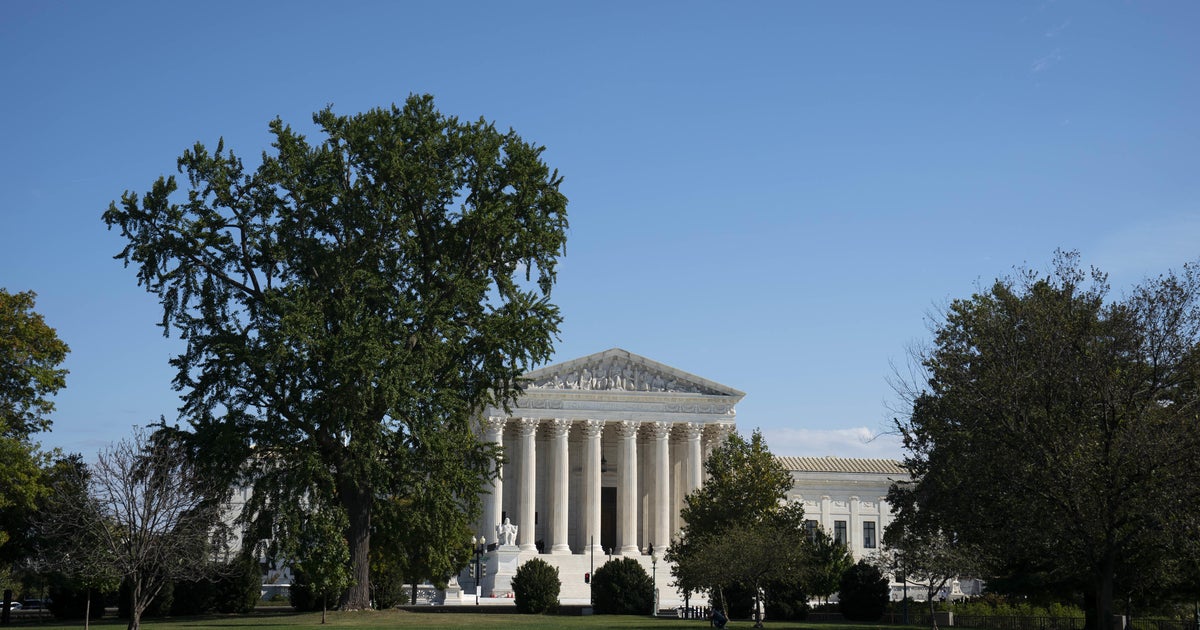
Washington — The Supreme Court will convene Monday to hear oral arguments in a pair of cases challenging a Texas law that bans most abortions after about six weeks of pregnancy, kicking off a consequential month for the high court that culminates with a case that abortion advocates warn is the biggest threat to reproductive rights in decades.
The high court will hear arguments in the disputes — one brought by the Justice Department and a second from abortion providers in Texas — just 10 days after agreeing to jump into the ongoing legal battle over the law, compressing a process that typically spans months into a matter of days. It’s unclear whether the justices will issue a decision with the same speed, and the law, the nation’s most restrictive, remains in effect while the proceedings play out.
The Texas measure at issue in the disputes prohibits abortions after embryonic cardiac activity is detected, usually at about six weeks and often before a woman is aware she is pregnant. But the justices will not be deciding the law’s constitutionality, although the Justice Department and abortion providers argue the ban conflicts with its decisions in Roe v. Wade and Planned Parenthood v. Casey.
Instead, the questions in both disputes involve the measure’s novel enforcement mechanism and whether the Biden administration or abortion providers can bring suits over the Texas ban in federal court.
“S.B. 8 was designed to nullify this court’s precedents and to shield that nullification from judicial review,” the Justice Department argued in a brief filed with the court last week. “So far, it has worked: The threat of a flood of S.B. 8 suits has effectively eliminated abortion in Texas at a point before many women even realize they are pregnant, denying a constitutional right the court has recognized for half a century.”
While other states have enacted laws that ban abortions when embryonic activity is detected, those measures have been blocked by federal courts because they violate the Supreme Court’s abortion precedents, which prohibit states from banning abortions before fetal viability, which generally occurs at around 22 to 24 weeks of pregnancy.
But the Texas law has been allowed to stay in effect, including by the Supreme Court, despite questions of its constitutionality. Unlike laws in other states, enforcement of the Texas ban is delegated to private citizens, not state officials, who can sue in state courts anyone who performs an abortion in violation of the law or “aids or abets” them.
Abortion providers argue the law was purposefully designed this way to evade federal court review of a “blatantly unconstitutional statute,” creating a “heads-I-win-tails-you-lose regime whose evident purpose is to deter and obstruct access to federal and state court,” they told the high court in a brief.
Both the abortion clinics and Justice Department have warned that if the Supreme Court allows the enforcement scheme to stand, it will pave the way for other states to pass laws targeting constitutional rights they disagree with.
“States need not comply with, or even challenge, precedents with which they disagree. They may simply outlaw the exercise of whatever constitutional rights they disfavor; disclaim enforcement by state officials; and delegate the state’s enforcement authority to members of the general public by empowering and incentivizing them to bring a multitude of harassing actions threatening ruinous liability — or, at a minimum, prohibitive litigation costs,” the Biden administration argued. “On Texas’s telling, no one could sue to stop the resulting nullification of the Constitution.”
Already, a Republican state lawmaker in Florida has introduced legislation that mirrors the Texas ban, while GOP elected officials in several other states have said they are considering similar bills.
But Texas Attorney General Ken Paxton believes neither the abortion providers nor Justice Department have the legal standing to sue, and told the Supreme Court the cases should be dismissed.
“The United States does not get a free pass around long-settled federal-courts doctrines because it would prefer to litigate in a federal forum just a bit faster,” Paxton wrote in a brief for the state last week.
Arguments in the two cases involving the Texas ban are taking place exactly one month before the justices are scheduled to hear a potentially more consequential dispute over a Mississippi law banning abortions after 15 weeks of pregnancy.
In that legal battle, Mississippi officials are asking the high court to overturn Roe, which established a woman’s right to an abortion, and Casey, which said states cannot impose an undue burden on a woman seeking an abortion before viability. Abortion providers warned the court that allowing Mississippi’s law to stand would upend 50 years of precedent and pave the way for states to ban abortion entirely.
The issue of abortion is coming before a Supreme Court that has been dramatically changed since its last major abortion decision nearly 30 years ago. With three justices appointed by former President Donald Trump, the high court now has a 6-3 conservative majority, and 228 Republican lawmakers told the high court that the Mississippi case provides it with “a chance to release its vise grip on abortion politics.”

